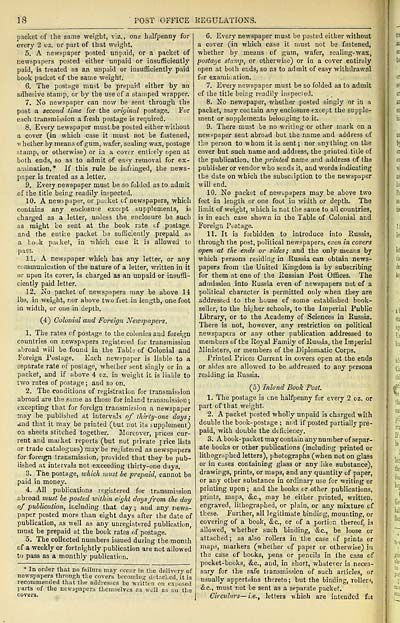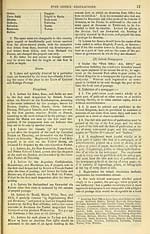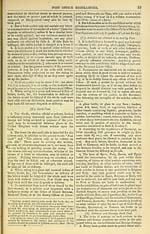Download files
Complete book:
Individual page:
Thumbnail gallery: Grid view | List view

18
POST OFFICE REGULATIONS.
packet of the same weight, viz., one halfpenny for
every 2 oz. or part of that weight.
5. A newspaper posted unpaid, or a packet of
newspapers posted either unpaid or insufficiently
paid, is treated as an unpaid or insufficiently paid
book packet of the same weight.
6. The postage must be prepaid either by an
adhesive stamp, or by the use of a stamped wrapper.
7. No newspaper can now be sent through the
post a second time for the original postage. For
each transmission a fresh postage is required.
8. Every newspaper must be posted either without
a cover (in which case it must not be fastened,
vi hether by means of gum, wafer, sealing wax, postage
.stamp, or otherwise) or in a cover entirely open at
both ends, so as to admit of easy removal for ex-
amination.* If this rule be infringed, the news-
paper is treated as a letter.
.9. Every newspaper must be so folded as to admit
of the title being readily inspected.
10. A newspaper, or packet of newspapers, which
contains any enclosure except supplements, is
charged as a letter, unless the enclosure be such
as might be sent at the book rate of postage,
and the entiie packet be sufficiently prepaid as
a book packet, in which case it is allowed to
pa-:s.
11. A newspaper which has any letter, or any
communication of the nature of a letter, written in it
or upon its cover, is charged as an unpaid or insuffi-
ciently paid letter.
12. No packet of newspapers may be above 14
lbs. in weight, nor above two fset in length, one foot
in width, or one in depth.
(4) Colonial and Foreign, Newspapers.
1. The rates of postage to the colonies and foreign
countries on newspapers registered for transmission
abroad will be found in the Table of Colonial and
Foreign Postage. Each newspaper is liable to a
separate rate of postage, whether sent singly or in a
packet, and if above 4 oz. in weight it is liable to
two rates of postage ; and so on.
2. The conditions of registration for transmission
abroad are the same as those for inland transmission ;
excepting that for foreign transmission a newspaper
may be published at intervals of thirty-one days;
and that it may be printed (but not its supplement)
on sheets stitched together. Moreover, prices cur-
rent and maiket reports (but not ptivate price lists
or trade catalogues) may be registered as newspapers
for foreign transmission, provided that they be pub-
lished at intervals not exceeding thirty-one days.
3. The postage, which must be prepaid, cannot be
paid in money.
4. All publications registered for transmission
abroad must be posted within eight days from the day
of publication, including that day ; and any news-
paper posted more than eight days after the date of
publication, as well as any unregistered publication,
must be prepaid at the book rates of postage.
5. The collected numbers issued during the month
cf a weekly or fortnightly publication are not allowed
to pass as a monthly publication.
* In order that no failure may occur in the delivery of
newspapers through the covers becoming detached, it is
recommended that the addresses be written on exposed
parts of the newspapers themselves as well as on the
covers.
6. Every newspaper must be posted either without
a cover (ia which case it must not be fastened,
whether by means of gum, wafer, sealing-wax,
postage stamp, or otherwise) or in a cover entirely
open at both ends, so as to admit of easy withdrawal
for examination.
7. Every newspaper must be so folded as to admit
cf the title being readily inspecled.
8. No newspaper, whether posted singly or in a
packet, may contain any enclosure except the supple-
ment or supplements belonging to it.
9. There must be no writing or other mark on a
newspaper sent abroad but the name and address cf
the person to whom it is sent; nor anything on the
cover but such name and address, the printed title of
the publication, the printed name and address of the
publisher or vendor who sends it, and words indicating
the date on which the subscription to the newspaper
will end.
10. No packet of newspapers may be above two
feet in length or one foot iu width or depth. The
limit of weight, which is not the same to all countries,
is in each case shown in the Table of Colonial and
Foreign Postage.
11. It is forbidden to introduce into Russia,
through the post, political newspapers, even in covers
open at the ends or sides; and the only means by
which persons residing in Russia can obtain news-
papers from the United Kingdom is by subscribing
for them at one of the Russian Post Offices. The
admission into Russia even of newspapers not of a
political character is permitted only when they are
addressed to the house of some established book-
seller, to the higher schools, to the Imperial Public
Library, or to the Academy of Sciences in Russia.
There is not, however, any restriction on political
newspapers or any other publication addressed to
members of the Royal Family of Russia, the Imperial
Ministers, or members of the Diplomatic Corps.
Printed Prices Current in covers open at the ends
or sides are allowed to be addressed to any persons
residing in Eussia.
(5) Inland Boole Post.
1. The postage is cne halfpenny for every 2 oz. or
part of that weight.
2. A packet posted wholly unpaid is charged with
double the book- postage ; arid if posted partially pre-
paid, with double the deficiency.
3. A book-packet may contain any number of separ-
ate books or other publications (including printed or
lithographed letters), photographs (when not on glass
or iu cases containing glass or any like substance),
drawings, prints, or maps, and any quantity of paper,
or any other substance in ordinary use for writing or
printing upon ; aud the books or other publications,
prints, maps, &c, may be either printed, written,
engraved, lithographed, or plain, or any mixture cf
these. Further, all legitimate binding, mounting, or
covering of a book, &c, or of a portion thereof, is
allowed, whether such binding, &c, be loose or
attached ; as also rollers in the case of prints or
maps, markers (whether of paper or otherwise) in
the case of hooks, pens or pencils in the case of
pocket-books, &c, and, in short, whatever is neces-
sary for the safe transmission of such articles, or
usually appertains thereto ; but the binding, roller*,
&c., must not be sent as a separate packet.
Circulars — i.e., letters which are intended fot
POST OFFICE REGULATIONS.
packet of the same weight, viz., one halfpenny for
every 2 oz. or part of that weight.
5. A newspaper posted unpaid, or a packet of
newspapers posted either unpaid or insufficiently
paid, is treated as an unpaid or insufficiently paid
book packet of the same weight.
6. The postage must be prepaid either by an
adhesive stamp, or by the use of a stamped wrapper.
7. No newspaper can now be sent through the
post a second time for the original postage. For
each transmission a fresh postage is required.
8. Every newspaper must be posted either without
a cover (in which case it must not be fastened,
vi hether by means of gum, wafer, sealing wax, postage
.stamp, or otherwise) or in a cover entirely open at
both ends, so as to admit of easy removal for ex-
amination.* If this rule be infringed, the news-
paper is treated as a letter.
.9. Every newspaper must be so folded as to admit
of the title being readily inspected.
10. A newspaper, or packet of newspapers, which
contains any enclosure except supplements, is
charged as a letter, unless the enclosure be such
as might be sent at the book rate of postage,
and the entiie packet be sufficiently prepaid as
a book packet, in which case it is allowed to
pa-:s.
11. A newspaper which has any letter, or any
communication of the nature of a letter, written in it
or upon its cover, is charged as an unpaid or insuffi-
ciently paid letter.
12. No packet of newspapers may be above 14
lbs. in weight, nor above two fset in length, one foot
in width, or one in depth.
(4) Colonial and Foreign, Newspapers.
1. The rates of postage to the colonies and foreign
countries on newspapers registered for transmission
abroad will be found in the Table of Colonial and
Foreign Postage. Each newspaper is liable to a
separate rate of postage, whether sent singly or in a
packet, and if above 4 oz. in weight it is liable to
two rates of postage ; and so on.
2. The conditions of registration for transmission
abroad are the same as those for inland transmission ;
excepting that for foreign transmission a newspaper
may be published at intervals of thirty-one days;
and that it may be printed (but not its supplement)
on sheets stitched together. Moreover, prices cur-
rent and maiket reports (but not ptivate price lists
or trade catalogues) may be registered as newspapers
for foreign transmission, provided that they be pub-
lished at intervals not exceeding thirty-one days.
3. The postage, which must be prepaid, cannot be
paid in money.
4. All publications registered for transmission
abroad must be posted within eight days from the day
of publication, including that day ; and any news-
paper posted more than eight days after the date of
publication, as well as any unregistered publication,
must be prepaid at the book rates of postage.
5. The collected numbers issued during the month
cf a weekly or fortnightly publication are not allowed
to pass as a monthly publication.
* In order that no failure may occur in the delivery of
newspapers through the covers becoming detached, it is
recommended that the addresses be written on exposed
parts of the newspapers themselves as well as on the
covers.
6. Every newspaper must be posted either without
a cover (ia which case it must not be fastened,
whether by means of gum, wafer, sealing-wax,
postage stamp, or otherwise) or in a cover entirely
open at both ends, so as to admit of easy withdrawal
for examination.
7. Every newspaper must be so folded as to admit
cf the title being readily inspecled.
8. No newspaper, whether posted singly or in a
packet, may contain any enclosure except the supple-
ment or supplements belonging to it.
9. There must be no writing or other mark on a
newspaper sent abroad but the name and address cf
the person to whom it is sent; nor anything on the
cover but such name and address, the printed title of
the publication, the printed name and address of the
publisher or vendor who sends it, and words indicating
the date on which the subscription to the newspaper
will end.
10. No packet of newspapers may be above two
feet in length or one foot iu width or depth. The
limit of weight, which is not the same to all countries,
is in each case shown in the Table of Colonial and
Foreign Postage.
11. It is forbidden to introduce into Russia,
through the post, political newspapers, even in covers
open at the ends or sides; and the only means by
which persons residing in Russia can obtain news-
papers from the United Kingdom is by subscribing
for them at one of the Russian Post Offices. The
admission into Russia even of newspapers not of a
political character is permitted only when they are
addressed to the house of some established book-
seller, to the higher schools, to the Imperial Public
Library, or to the Academy of Sciences in Russia.
There is not, however, any restriction on political
newspapers or any other publication addressed to
members of the Royal Family of Russia, the Imperial
Ministers, or members of the Diplomatic Corps.
Printed Prices Current in covers open at the ends
or sides are allowed to be addressed to any persons
residing in Eussia.
(5) Inland Boole Post.
1. The postage is cne halfpenny for every 2 oz. or
part of that weight.
2. A packet posted wholly unpaid is charged with
double the book- postage ; arid if posted partially pre-
paid, with double the deficiency.
3. A book-packet may contain any number of separ-
ate books or other publications (including printed or
lithographed letters), photographs (when not on glass
or iu cases containing glass or any like substance),
drawings, prints, or maps, and any quantity of paper,
or any other substance in ordinary use for writing or
printing upon ; aud the books or other publications,
prints, maps, &c, may be either printed, written,
engraved, lithographed, or plain, or any mixture cf
these. Further, all legitimate binding, mounting, or
covering of a book, &c, or of a portion thereof, is
allowed, whether such binding, &c, be loose or
attached ; as also rollers in the case of prints or
maps, markers (whether of paper or otherwise) in
the case of hooks, pens or pencils in the case of
pocket-books, &c, and, in short, whatever is neces-
sary for the safe transmission of such articles, or
usually appertains thereto ; but the binding, roller*,
&c., must not be sent as a separate packet.
Circulars — i.e., letters which are intended fot
Set display mode to: Large image | Transcription
Images and transcriptions on this page, including medium image downloads, may be used under the Creative Commons Attribution 4.0 International Licence unless otherwise stated. ![]()
| Scottish Post Office Directories > Towns > Glasgow > Post-Office annual Glasgow directory > 1875-1876 > (914) |
|---|
| Permanent URL | https://digital.nls.uk/84185721 |
|---|
| Description | Directories of individual Scottish towns and their suburbs. |
|---|
| Description | Around 700 Scottish directories published annually by the Post Office or private publishers between 1773 and 1911. Most of Scotland covered, with a focus on Edinburgh, Glasgow, Dundee and Aberdeen. Most volumes include a general directory (A-Z by surname), street directory (A-Z by street) and trade directory (A-Z by trade). |
|---|


